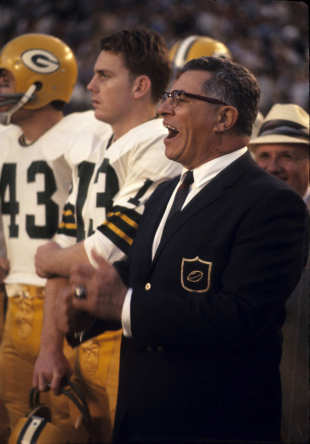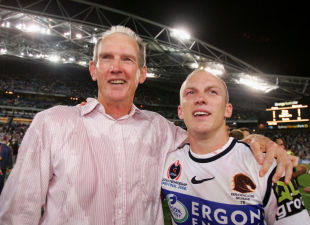|
US Eagles v New Zealand
Marginal Gains: Rugby's bond with the NFL
Tom Hamilton in Chicago
October 31, 2014

Bill Walsh has left an indelible mark on sport and has formed part of rugby's coaching ethos © Getty Images
Enlarge
Rugby management is split into two. There is introspection where the coach tries to improve his side from within by addressing culture and player pathways, but there is that other element, one where they are constantly keeping an eye on the opposition to see what is being done differently. As Sir Clive Woodward put it, it is about finding those extra "one percenters", the marginal gains. The same goes for players; the unknown is appealing. The past decade has seen the rate of transfers from one continent to another increase year-on-year as players increasingly have the carrot of foreign riches toyed in front of their eyes. As America becomes accustomed to rugby and the wonderful physicality of the sport, there will no doubt be various football coaches keeping an eye on some of the game's talent on Saturday at a sold-out Soldier Field. They may start to ponder if a winger can do a job as a running back, or if the forwards can play in defence. Star winger Julian Savea admitted earlier this week he was being seduced by the allure of trying his hand at American football and following in the footsteps of rugby league's Jarryd Hayne, the Australian who quit the NRL to chase a contract with an NFL franchise. And Cory Jane echoed as much on Thursday. "I love the football, it's my favourite sport. Everyone would love to give it a go and to see what it's like, put the pads on and have a couple of runs. If Jarryd does well, people might start looking at the potential for more moves. We are both built the same." 
Jarryd Hayne's move to the NFL could open the floodgates
© Getty Images
Enlarge
It is a path trodden by rugby union players in the past. Welsh fullback Terry Price played for the Lions on their 1966 trip to Australia and New Zealand and then tried out for Buffalo Bills as a placekicker. Ronan O'Gara was linked with a move to American football but it did not materialise; instead the rumours only served to increase his new deal from Munster. Hayden Smith left Saracens to play for the New York Jets at tight end, and had a run out in the NFL, but now finds himself back in union and will face the All Blacks on Saturday. Last year, Kenyan Sevens player Daniel Adongo signed as an outside linebacker for the Indianapolis Colts but injury prevented him from making his debut. On the flip side, Carlin Isles was in the Detroit Lions' practice squad before moving to Sevens and flirting with XVs while Richard Tardits went from the Patriots to Biarritz. While the playing transition from top-level rugby to the upper echelons of NFL and vice versa is still in the infant stages of the pathway, American sport has had a huge influence on rugby coaches' philosophies. The thirst for knowledge has seen coaches break away from the confines of rugby and look abroad. When the public and press were getting to know Stuart Lancaster back in 2012, when he went from domestic obscurity to England coach in the blink of an eye, he put much of his coaching philosophy down to his thirst for knowledge. "I've learned from leadership books," Lancaster said. "If people want to know which book in particular has influenced me, it's The Score Takes Care Of Itself by Bill Walsh. It's about the San Francisco 49ers' journey. It is probably the one book I refer to more than any other. I refer to it a lot and try to get through to the players what it takes to build a great and successful sporting team." Alongside the thoughts of Walsh, the man who turned the 49ers from also-rans to a dominant force in the early 1980s, Lancaster also researched John Wooden's Pyramid of Success. Wooden's school of thought saw him win 10 college basketball titles from 1964 through to 1975. There was also Vince Lombardi's ethos that was so successful for the Green Bay Packers the Super Bowl trophy now carries his name. For Lancaster, one Lombardi soundbite resonates: "The difference between a successful player and others is not a lack of strength, not a lack of knowledge but rather a lack of will."
Lancaster has imparted that on his current squad along with the constant message surrounding the importance of culture since he took over the England post in the wake of the 2011 World Cup, and it has been a theme constant throughout his tenure. At domestic level in England, Harlequins coaches Collin Osborne and Mark Mapletoft visited the Philadelphia Eagles in the off-season to pick their brains. Saracens have turned to basketball for inspiration as they attempt to bounce back from losing two finals last term; they are seeking to become rugby's version of the San Antonio Spurs. And then there is the Moneyball theory adopted by Billy Beane when he turned the relatively cash-strapped Oakland A's into challengers for the World Series by looking at the numbers behind the glaringly obvious statistics. He looked outside of the normal parameters, and that struck a chord with former All Blacks coach Wayne Smith. While Beane had Paul dePodesta - the man who formed their Moneyball logic - Smith found Ken Quarrie, an individual with a PhD in statistics. Before Smith discovered him, the All Blacks had one idea of the tackle. Statistics and Quarrie found a different perspective. "Back then we were using raw data, like tackles made and tackles missed," Smith said back in 2012. "Then we started qualifying the process by asking how effective the tackle was. Once I read Moneyball the seed of an idea started about looking carefully at total contribution." 
The great Vince Lombardi
© Getty Images
Enlarge
Quarrie's work saw them identify the necessary outliers in tackling which helped them win the 2011 World Cup and also helped Wayne Smith's Chiefs sides to the Super Rugby title in 2012 and 2013. They had less time on the ball than every other team in the league but they were ruthless when they had their hands on the pill. For US Eagles coach Mike Tolkin, when you live in a country saturated with such logic, knowing about Walsh's theory is given as read. The lack of a rugby footprint has seen him look to British & Irish Lions coach Carwyn James and New Zealand for foundation stones in his philosophy. "Early on for me, I looked to the foreign rugby coaches," Tolkin told ESPN. "When I was young coaching, Carwyn James struck me as it was all about fundamentals and playing the game with a positive attitude. That's always been something important and he was ahead of his time in terms of individual skills and fitness levels. I think Wayne Smith was the next in that generation of approach and he's worked with Pierre Villepreux on that approach. "And then you have the American models the Belichicks, the Bill Walshs and you go back to Lombardi and that was more about discipline and the formalities over how you do your business. Most coaches have read some of Walsh's book and it has an influence. "I think it's important to mix those up. The mix of regimented style versus open-mindedness to be positive is important. My philosophy has changed over the years. In general it is a positive approach to the game and let's have a go. It's become a little toned down as international rugby is about territory so you have to deal with the reality of that." While Tolkin has to look elsewhere for those marginal gains to help his squad, the likes of New Zealand's Steve Hansen, brought up in a country completely focused on rugby, find inspiration for improvement on the doorstep. "I've never been a great follower of the gridiron, I've never had three hours to spare to sit down and watch it," Hansen said on Thursday. "You've had some great coaches, though; a guy called Lombardi wasn't too bad, was he, and he's influenced a lot of coaches throughout the world. 
Broncos legend Wayne Bennett (left) with Darren Lockyear
© Getty Images
Enlarge
"Probably the man who has influenced me the most outside of my father, who was a great coach in his own right, was a guy called [Australian rugby league 'supercoach'] Wayne Bennett, and I know he spent a lot of time in the States. He picked up a lot of stuff from the way they coach over here. You cross-pollinate with a lot of sports but my main influence has come from individual people." Though Hansen looked to his late father, Des, who coached the Marist club in the 1980s, and multiple rugby league premiership winner Bennett to form his coaching philosophy, the wider umbrella of the All Blacks does not rest on its laurels. They too are coming to America. "We've been lucky enough to spend time in New York and we spent time with the Yankees and Giants," Hansen said. "Everything over here is big compared to back home and they have a lot of money to do the research and make mistakes with. We can't make mistakes as we can't waste the money. Right across the board there are impressive things but they learn things from us too. We can't afford to waste opportunities." While the ramifications of Saturday's game may not fully be appreciated for a couple of years in the USA - after years of trying, interest in rugby will not explode overnight - it signifies a wonderful marrying of two sports based on fundamentally the same principles of tactics and physicality. American sport and rugby have held a reciprocal relationship. Rugby being played on Soldier Field may yet see an increased assimilation between rugby and football both in finding those marginal gains and, if Savea gets his wish, practice. © ESPN Sports Media Ltd Tom Hamilton is the Associate Editor of ESPNscrum.
| |||||||||||||||
Live Sports
Communication error please reload the page.
-
Football
-
Cricket
-
Rugby
-
- Days
- Hrs
- Mins
- Secs
F1 - Abu Dhabi GP
Abu Dhabi Grand Prix December 11-131. Max Verstappen ()
2. Valtteri Bottas (Mercedes)
3. Lewis Hamilton (Mercedes)
4. Alexander Albon ()
5. Lando Norris ()
6. Carlos Sainz Jr ()
-
ESPNOtherLive >>
Darts - Premier League
Golf - Houston Open
Snooker - China Open
Tennis - Miami Open

